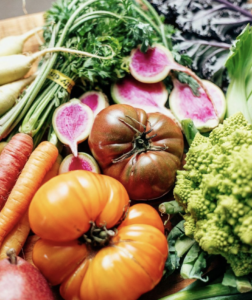April 2025
We recently received a note from one of our Owners asking how the recent policy changes related to trade tariffs will impact the Co-opportunity Market. The question was timely and, we imagine, at the top of other owners’ minds as well. So we asked our CEO, Cindy Chikahisa, to shed some light on the issue and share her insights on what changes Owners can expect to see at the store in the coming months.
————
The Co-opportunity Market team appreciated our customers’ support and patience as we navigated the raw milk and egg shortages earlier this year. As owners may be aware, many factors impact the food consumers buy, and we certainly see Mother Nature’s influence in these two categories.
The new administration’s tariffs will impact the grocery industry since approximately 20% of food is imported into our country. Retailers purchase products from other countries; even local food manufacturers often utilize international raw goods. However, Co-opportunity Market is committed to continuing to abide by our purchasing guidelines, which we believe will help mitigate the impact of these tariffs:
- When available, the Co-op prioritizes local and USA-grown products that meet our standards.
- We also prioritize buying organic produce from California or within the United States whenever possible.
Seasonality and weather conditions also affect our purchasing—for example, at the start of the stone fruit season, we may only be able to get some of the items that come to us from Chile. Additionally, avocados and bananas traditionally come from outside the United States and are grown in regions like Mexico and Ecuador. The same applies to some of our bulk items—while we prioritize purchasing from local or USA-grown sources, some are sourced from other countries.
The Co-op also carries several items from traditionally imported categories such as coffee, olive oil, chocolate, and coconut. Before the news of tariff increases, we were already experiencing cost increases for coffee and chocolate due to sourcing challenges, leading to a massive shortage.
We want our Owners to know that the Co-op will need to respond to some of these events, whether due to tariff increases or shortages, with increasing prices for some items. However, please know that we will only raise an item’s price if the supplier sends us an increase. When we faced the egg crisis, we did not raise prices because vendors never passed increases to us.
We also wanted to share some of the statements shared recently by the California Growers Association:
It’s important to note that Mexico and Canada are exempt from the new reciprocal tariffs, though they are still subject to prior 25% tariffs. Under the United States-Mexico-Canada Agreement (USMCA), agricultural and food products from these two countries are exempted.
Reporting for Axios, Emily Peck writes, “Though those countries are now subject to 25% tariffs, there are exemptions under the USMCA that allow imports of goods that are made or grown in those countries. Canada is a top chocolate exporter. Mexico supplies a substantial amount of our fresh fruits and vegetables. In other words, there will be avocados.”
While trade changes and the impact of tariffs remain volatile, the Co-opportunity Market continues to monitor costs closely. If the prices of some items increase substantially, we may discontinue them temporarily. In serving our Owners, we will do our very best to minimize the impacts of the international trade tariffs.





